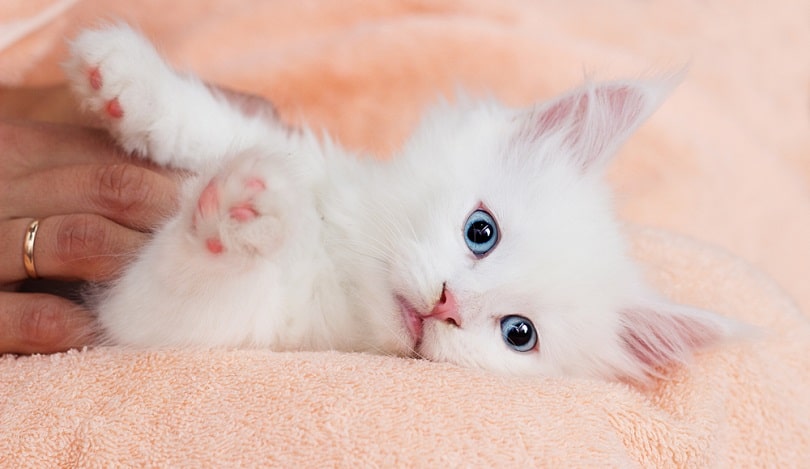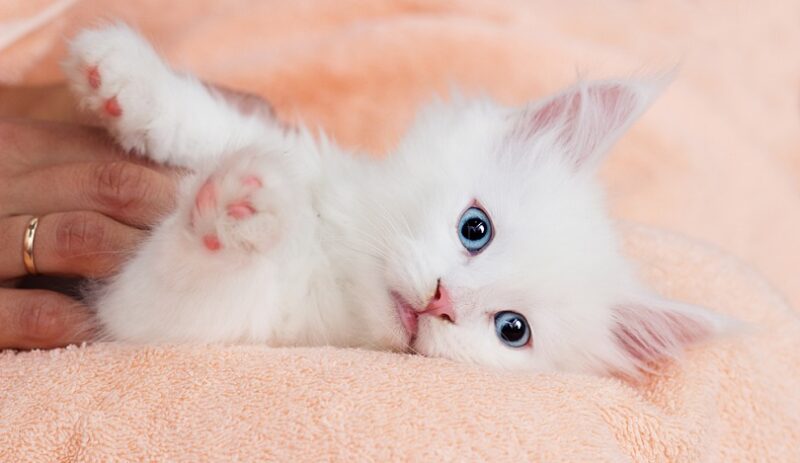Cats can make incredible pets that shower you with attention and affection. They can be confident, lively, and fun, but it is important to keep them happy. That can include feeding them well, offering enrichment with play sessions, and finding other ways to keep them healthy. By meeting your cat’s needs, you not only ensure they are content, but you also improve your bond with them, and it can help reduce unwanted and inappropriate behavior.
Below are 23 effective ways to make your cat happy and ensure they lead a positive and enjoyable life with you.
The 23 Ways on How to Make Your Cat Happy
1. Get Good Scratching Posts
Cats need to scratch. It helps maintain their claws by sharpening them and keeping them trim, but they also scratch for a host of other reasons, including stress relief and to mark territory. If you don’t provide an appropriate spot to scratch, your cat will find their own, which generally involves furniture, carpets, and other unwanted areas.
Buy at least one high-quality scratching post, pad, or other scratcher. If your cat is already scratching furniture, place the scratcher nearby. Otherwise, choose somewhere your cat likes to regularly frequent and place it here.
2. Install a Climbing Tree
Cats love to climb. If they spend time outdoors, they’ll spend a lot of time climbing trees, fences, and even buildings. If your cat is an indoor cat, you can still provide climbing opportunities. A climbing tree typically has a central column with platforms around the column leading upwards.
It might also include scratching posts, hanging toys, tunnels, beds, and other items. You can add floating shelves or other items fixed to the walls that your cat can use to climb and reach elevated positions.
3. Groom Regularly
Grooming helps keep your cat’s coat clean by removing grease, dirt, and other debris. It also helps effectively spread the natural oils in your cat’s fur around their coat, preventing the hair from drying out and keeping the coat in good condition. Grooming is especially beneficial for long-hair cats because it prevents knotting, but it should be a part of your weekly schedule with any cat.
Another benefit of regularly brushing your cat is that it can help develop a bond between the two of you. Start when your cat is still a kitten and maintain a regular timetable, ideally grooming at least twice a week but potentially every day for some cats.
4. Buy New Toys
Cats love toys. They especially enjoy chasing small toys or small items because they activate their prey instinct. Small crinkly toys look like small rodents or insects, and the crinkling noise is reminiscent of the sound prey would make while running away. You may find your cat quickly gets bored of new toys, but that doesn’t mean you have to throw them away.
You can provide several toys, and when you notice your cat stops playing with one or more, remove them and put them in a cupboard somewhere. Replace them with new toys or take an old toy out of the cupboard. You can keep refreshing the toy selection in this way, ensuring your cat has appealing toys while reducing the amount you spend on them.
Our Favorite Cat Toys Right Now Here are a some of our favorite toys, each catering to a variety of senses and play preferences. Which one will your feline fancy? At Catster, we've admired Hepper for many years, and decided to take a controlling ownership interest so that we could benefit from the outstanding designs of this cool cat company!
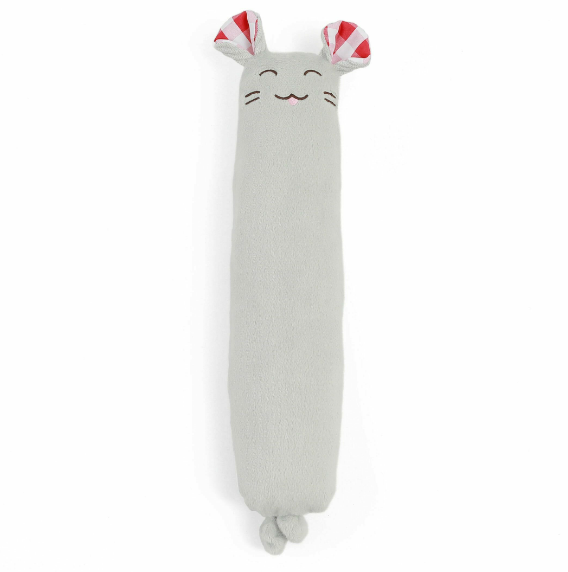

Hepper Plush Mouse Kicker Toy
Hepper Furball Toy Set
Multisensory
Encourages self play
Large
Durable
Lightweight
Set of 2
5. Choose Healthy Treats
Treats can be effective training tools, but it’s also nice to give your cat an occasional treat to show you care. If you give them treats regularly, ensure they are healthy and not too fattening.
Obesity is a big problem for cats, and it can be very difficult for your cat to lose weight once they have piled on the pounds. Look for treats that are low in calories and ideally offer nutritional value. If you use them for training purposes, ensure that you consider the calories when calculating your cat’s daily food allowance.
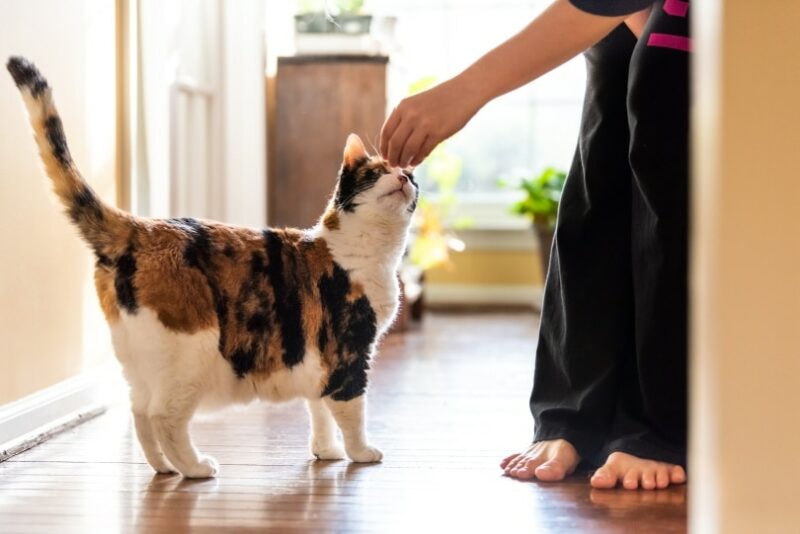
6. Hide the Treats
You can also use the treats to encourage your cat’s hunting instinct. Take the treats and hide them around the house. Start by putting them in obvious places where they will be easy to find. As your cat gets better at finding them, you can look for more cunning hiding places. You will need high-value treats with a strong smell to give your cat a chance to find them easily.
7. Offer Boxes and Bags
It isn’t just toys that cats like to play with. They enjoy sitting on paper and hanging out in cardboard boxes; some even like climbing and playing in paper bags. Ensure that anything you provide is safe, and consider that your cat might choose to eat the box or bag they play with.
Cats enjoy hiding in a box and jumping out at you when you pass. They might like to hide in the box out of the way of noise in the house.
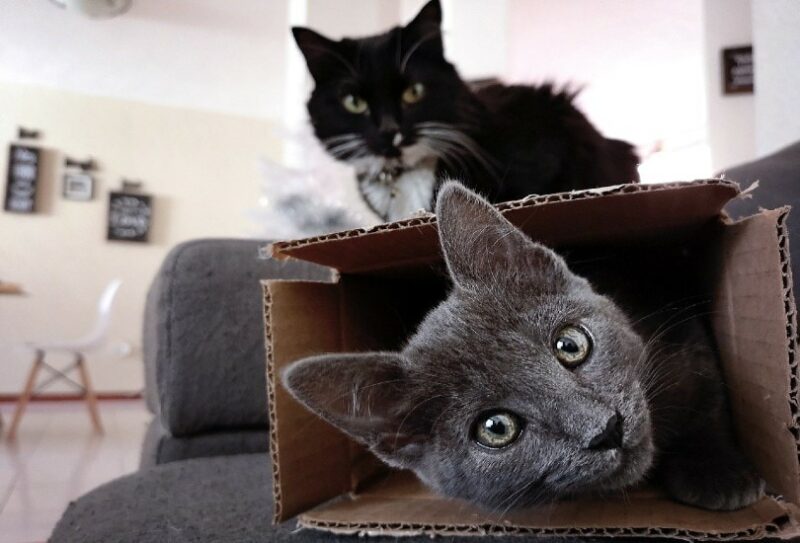
8. Freshen Up the Water
All animals need water to survive. If you feed wet or canned food, your cat will get some of the water they need from the moisture, but you should still provide a bowl of water. Ensure that the water is easily accessible, but keep it away from the litter box; some cats prefer that their water is not too close to the food.
The water should also be fresh, so you will need to change it every day. Even with fresh water that is easily accessible, some cats are reluctant to drink water straight from a bowl, and you might need to consider a cat water fountain.
Not every cat water fountain will make your life easier. This is why we recommend the well-designed Hepper Stainless Steel Cat Water Fountain, which has advanced triple filtration, three different flow modes, and an automatic shutoff feature.
This modern, minimalist fountain runs surprisingly quietly and is very easy to clean. At Catster, we’ve admired Hepper for many years and decided to take a controlling ownership interest so that we could benefit from the outstanding designs of this cool cat company!
9. Get a Good Quality Litter Tray
Litter boxes are essential for all cats, even those allowed outside. It is generally accepted that you should have one box per cat plus one extra. This allows your cat, or cats, to choose which one to choose and ensure it is clean.
The boxes should be placed in different rooms and be accessible. At least one side of the box should be against a wall and not be placed in busy areas. As well as standard litter trays, you can consider self-cleaning models. Selecting a good quality litter that your cat appreciates is also an essential step in the litter process.
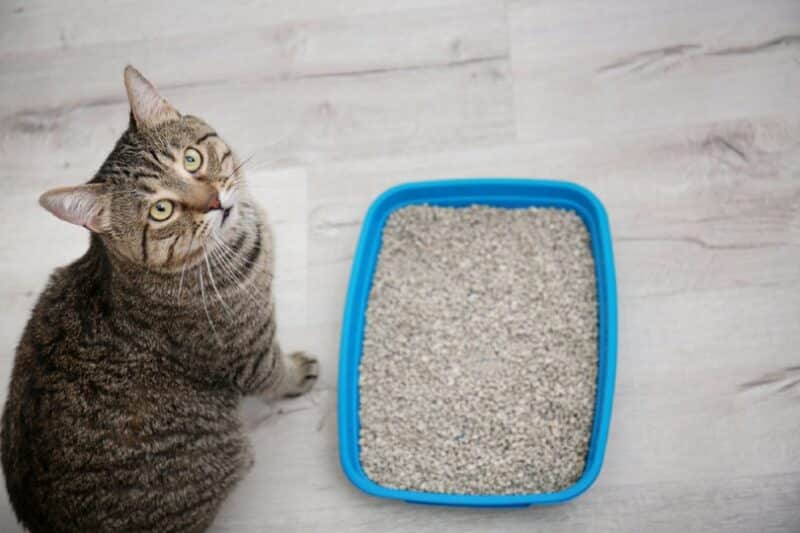
10. Cuddle
Although some cats can be aloof and prefer their personal space, others are loving and cuddly. Try to spend time cuddling and loving your cat every day. While you might meet other people when you leave the house, you are probably one of the few people that your cat sees.
Whether you let your cat sit on your lap while you read the morning newspaper or watch TV, they will appreciate the closeness.
11. Get Catnip
Catnip is a member of the mint family, and, to humans, it is innocuous. However, it can send cats into a frenzy when they smell it and calm them when they eat it. Your cat will likely respond to catnip by rolling in it, rubbing it, and flicking it around.
You can buy catnip-scented toy or buy bags of catnip and sprinkle a little on the floor. It doesn’t harm your cat; it’s fun to watch, and your cat will appreciate you supplying it.
Our Favorite Catnip Toy Great cat toys are crucial to keeping your cat happy and healthy. We love Hepper's Catnip Stick Toy because it's handmade in the USA, available in a cool range of colors, and sturdy enough to withstand your cat's sharp claws. Best of all, you won't find any filler here – just 100% organic catnip!
At Catster, we’ve admired Hepper for many years and decided to take a controlling ownership interest so that we could benefit from the outstanding designs of this cool cat company!
12. Buy Comfortable Beds
Our feline friends can sleep 16 hours a day, and while yours might enjoy spending time in your sock drawer or napping in the laundry basket, providing your cat with a bed not only gives them somewhere to sleep but also gives them a small space to call their own.
There are many types of cat beds, from doughnuts to cat caves. However, some cats love nothing more than sleeping in a corrugated box.
Keeping your cat comfortable and feeling secure when you are away will have them well rested and ready to play when you return. The Hepper Nest is a modern cat bed designed to meet the specific needs of cats. Its high sides offer a sense of security and the bowl shape gives support like a warm hug from their favorite person. Learn more about why your cat will thrive in your absense with the Hepper Nest by clicking here.
At Catster, we’ve admired Hepper for many years and decided to take a controlling ownership interest so that we could benefit from the outstanding designs of this cool cat company!
13. Create Somewhere to Hide Out
Some cats prefer alone time to being petted or cuddled, but most cats like to have solitude at some point. Providing them with a little spot to hide out and to stay away from the hustle and bustle of the house lets them sleep and enjoy a calm atmosphere.
The hideout could be a bed placed in a dark corner or an open cupboard door so your cat can climb in and sleep among the bedding.
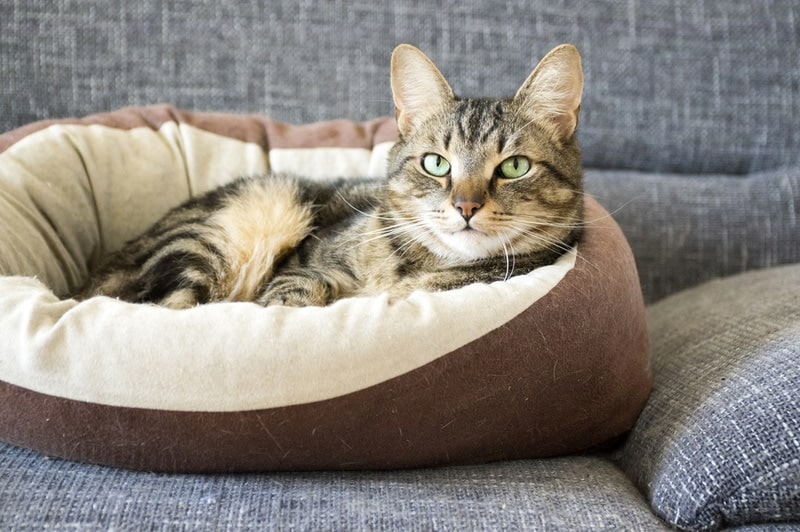
14. Play Often
Cats need toys, but they also need somebody to play with them. Try to put aside a little time every day to play with your cat’s toy mice or wand toys. It will provide physical exercise as well as mental stimulation and is another excellent way to develop the bond between you and your cat.
15. Try Training Them
Most cat owners know that their cats can be trained to use a litter box rather than just doing their business wherever they want, but most cats can be trained to do much more.
You can use the toys and treats to help you train your cat to play fetch. Sit a little distance away and throw the toy. When your cat picks up the toy, encourage them over. If they approach with the toy, give them a treat and throw the toy again. It can take a while to master, but it is just one of many tricks you can teach. Some owners train their cats to high-five, spin around, or lie down.
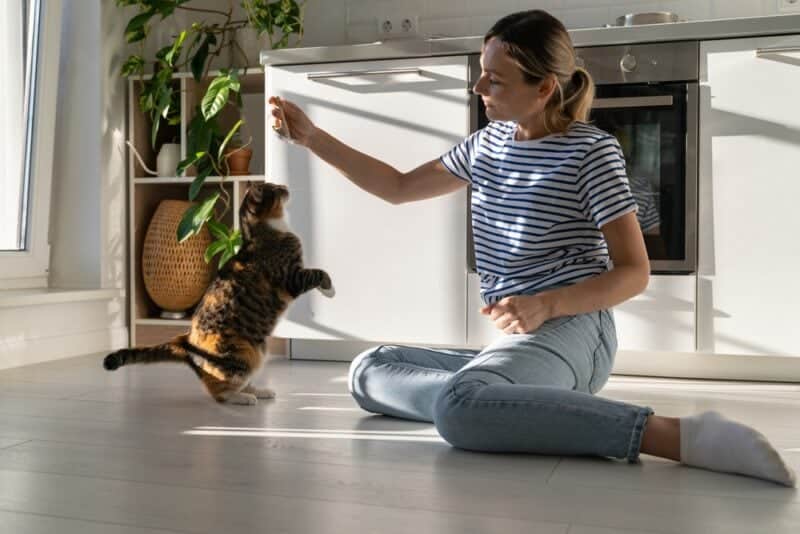
16. Use Puzzle Feeders and Interactive Toys
You can provide enrichment for your cat even when you’re unavailable to play. As well as buying the usual wand toys, look for interactive toys. Your cat has to manipulate them to find the treat hidden inside. Show your cat that there are treats inside, and start with the easiest setting. When they master the easy toy, move on to something more challenging.
17. Create Window Perches
Cats love to look out of the window. They enjoy watching birds, other animals, and people as they go about their lives. It’s kind of like your cat’s equivalent of watching TV.
Clear space on the window ledge so your cat can sit and watch. Alternatively, buy a bed that attaches to the top of the radiator or window. You can also put the cat tree next to the window so your cat can perch on the cushioned platform and watch the outside world.
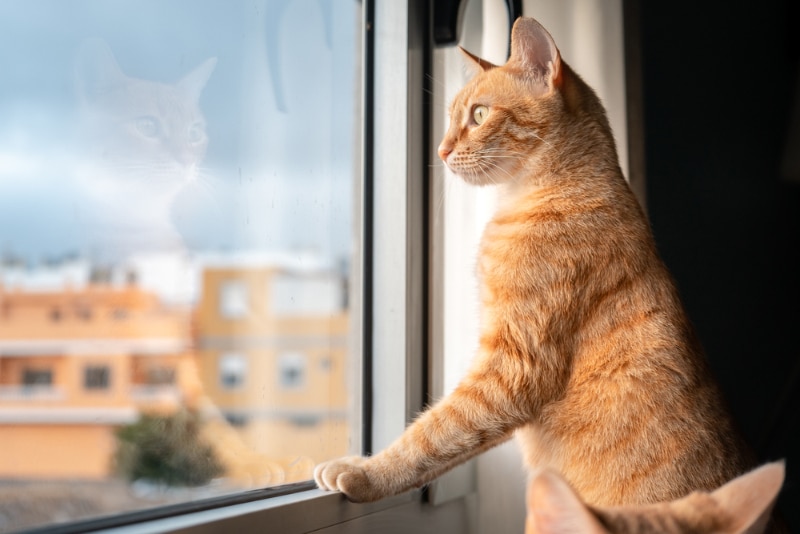
18. Get Your Cat a Feline Friend
You can consider getting a second cat if you have the space, time, and money. Two cats will keep one another company. They will play with each other and form a very close bond.
If you get a second cat, make gradual introductions. Ensure they both have their own space, beds, and toys. Keep first meetings brief and let them disappear to their own spaces. Don’t try to force the issue; if there is any hissing or aggressive behavior, separate the cats before trying again the next day or later.
19. Walk Your Cat
Walking a pet is often associated with dogs, but you can walk your cat. Buy a harness and leash, put them on, and try taking your cat for a walk around the block. Choose a quiet area where you aren’t likely to see dogs. Your cat might get along well with dogs, but some dogs can be aggressive.
Are you looking for the perfect cat harness? We suggest Hepper's Cat Harness & Leash Set, which includes a nicely designed, machine-washable harness made from soft, sturdy velvet and mesh.
This harness is easy to put on and take off and features reinforced stitching, reflective stripes, and quick-release buckles. This set also includes a great leash made from durable nylon climbing rope. At Catster, we’ve admired Hepper for many years and decided to take a controlling ownership interest so that we could benefit from the outstanding designs of this cool cat company!
20. Build a Catio
Rather than walking your cat, you could build a catio, which is a fenced and secured outdoor area where your cat can hang out. Generally, the catio is attached to a window so they can get in and out whenever they want.
You can buy catio kits or have somebody build one for you. Or, if you’re good at DIY, you can create your own using wood and some kind of secure fencing.
21. Create a Routine
Cats like routine, so you should try to stick to a schedule that is as regular as possible. Your feline friend will expect to be fed at roughly the same time each day, and they will recognize when it is time for bed, for you to leave the house, and even when it is time to sit and cuddle up while watching TV.
Some cats can get anxious or stressed if their routine gets messed up, but it’s okay to feed your cat an hour or so later than usual now and then.
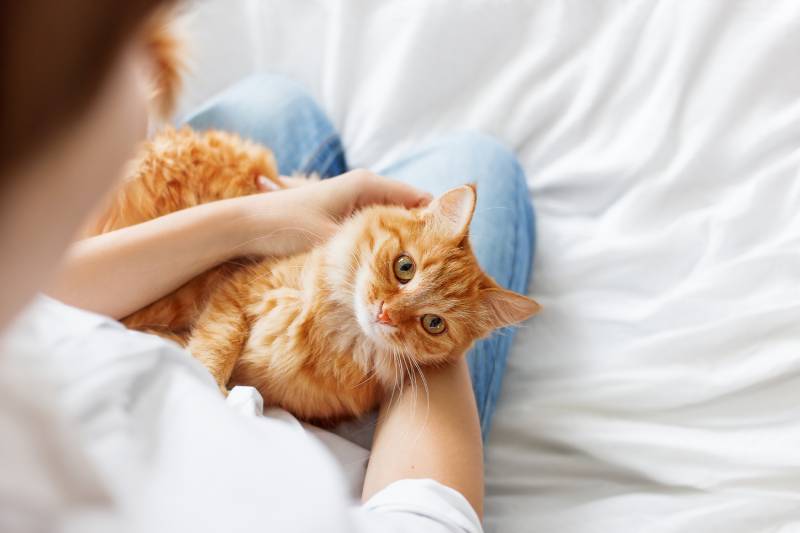
22. Clean Up Regularly
Cats are naturally clean animals. You will notice that your cat won’t use the litter tray if you have failed to empty it. Scoop solids whenever you see them and remove wet litter once a day. You should also give the litter box a thorough cleaning every week to get rid of stubborn dirt and litter that has stuck to the inside of the tray.
You should also clean the cat bed, blankets, and other items that need cleaning regularly.
Did you know there's an enzyme cleaner that does it all? The Hepper Advanced Bio-Enzyme Pet Stain & Odor Eliminator Spray permanently removes the very worst smells and stains (truly, everything you can imagine!), and they offer a 100% satisfaction guarantee! Click here to get yourself a bottle.
At Catster, we’ve admired Hepper for many years, and decided to take a controlling ownership interest so that we could benefit from the outstanding products of this cool cat company!
23. Plant Cat Grass Indoors
Cats are carnivores, and they thrive on meat. However, they can eat some plants and greens. Catnip, for example, is impossible for most cats to turn their noses up at.
You can also serve cat grass, which you can grow indoors and let your cat chew on it whenever they want. There are different types of cat grass, including oat grass and wheatgrass. They are safe for your cat and even provide some health benefits.
Conclusion
Pet cats are an integral part of the family and play an essential role in many of our lives. As well as ensuring they are healthy, with regular vet checks and by feeding a good quality food, you can provide additional enrichment and pleasure by following the 23 steps and tips above.
However, the key is to spend time interacting with your cat. They will appreciate regular play time with you, and it will help you bond with your cat.
You might also like: 25 Top Cat Blogs Every Kitten Lover Should Read
Featured Image Credit: Sviatoslav_Shevchenko, Shutterstock
Contents
- The 23 Ways on How to Make Your Cat Happy
- 1. Get Good Scratching Posts
- 2. Install a Climbing Tree
- 3. Groom Regularly
- 4. Buy New Toys
- 5. Choose Healthy Treats
- 6. Hide the Treats
- 7. Offer Boxes and Bags
- 8. Freshen Up the Water
- 9. Get a Good Quality Litter Tray
- 10. Cuddle
- 11. Get Catnip
- 12. Buy Comfortable Beds
- 13. Create Somewhere to Hide Out
- 14. Play Often
- 15. Try Training Them
- 16. Use Puzzle Feeders and Interactive Toys
- 17. Create Window Perches
- 18. Get Your Cat a Feline Friend
- 19. Walk Your Cat
- 20. Build a Catio
- 21. Create a Routine
- 22. Clean Up Regularly
- 23. Plant Cat Grass Indoors
- Conclusion

